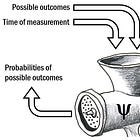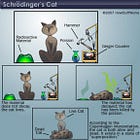Aurocafe is — at any rate, has been so far — about “consciousness conundrums, quantum quandaries, the evolution of reality, and all that.” My interest in the second item culminated in a textbook, a couple of follow-up articles (here and here), and a “eulogy” of the subject on this platform. Since I do not intend to say much more on “What quantum is trying to tell us”,1 I’m offering a list of my past posts/emails on that topic, interspersed with a few significant quotations, especially for my more recent subscribers. This is the first installment. See here for the second and here for the third.
I would say there’s much more difference ... between a human being who knows quantum mechanics and one that doesn’t, than between one that doesn’t and the other great apes. The big divide is between people who know quantum mechanics and people who don’t.2
I have taught graduate courses in quantum mechanics for over 20 years at Columbia, Stanford, Oxford and Yale, and for almost all of them have dealt with measurement in the following manner. On beginning the lectures I told the students, “You must first learn the rules of calculation in quantum mechanics, and then I will tell you about the theory of measurement and discuss the meaning of the subject.” Almost invariably, the time allotted to the course ran out before I had to fulfill my promise.3
One of the most ancient philosophical questions (Heidegger thought it was the question) is this: why is there something rather than nothing? In terms of events rather than substances, the question would be: how come anything happens at all? That question is the measurement problem.4
This was the title of my response to David Mermin’s “What is quantum mechanics trying to tell us?” (Am. J. Phys. 66, 753–767, 1998). See this for more on my exchange with Mermin.
Murray Gell-Mann (winner of the 1969 Nobel Prize in Physics) at the annual meeting of the American Association for the Advancement of Science in Chicago on February 11, 1992. (T. Siegfried, The bit and the pendulum: From quantum computing to M theory, pp. 177–178, Wiley, 2000)
Willis Lamb (winner of the 1955 Nobel Prize in Physics), An operational interpretation of nonrelativistic quantum mechanics, Physics Today 22 (April 1969), 23–28.
Arthur Fine in: Maximilian Schlosshauer, Elegance and Enigma: The Quantum Interviews (Springer, 2011), p 146.












